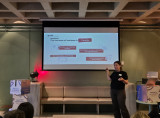On December 6 and 7 the Smart Cities Summit was organised in Boston. Here stakeholders from the public & private-sector ecosystems met to help tomorrow’s cities face the challenges of growing urban populations with the latest IoT technology.
The common theme was that data is an enabler and an asset that municipalities are trying to wrangle. Dominick Tribone, customer experience lead for Massachusetts Bay Transportation Authority, said that his group is using information from ridership and transactions to enhance services. But there are limitations. Tribone noted that the MBTA knows when someone checks in to the system, but has to infer when that person gets off.
"We want to get to real-time trip planning," said Tribone.
Meanwhile, Paul Comfort, CEO, Maryland Transit Administration (MTA), said his group is revamping routes to ease congestion in Baltimore with a hub-and-spoke system. Technologies will be used to hold the light green for busses and align connections between bus and trains.
"We collected two years of data on the transportation system, where the jobs are and where people are really going," said Comfort. "We're removing 1,000 stops from our system because people weren't using them. Data is helping us do that."'
Nearly every CIO noted that smart city projects revolve around how data is being used. For instance Kansas City is using data from Google's Waze and sucking in information available via public application programming interfaces.
What executives cautioned is that flooding smart city projects with data may not work due to access, analytics, availability and the ability to turn big data into insights. There are also privacy issues that abound. "There's a balance between having enough information to improve service and privacy," said Tribone.




